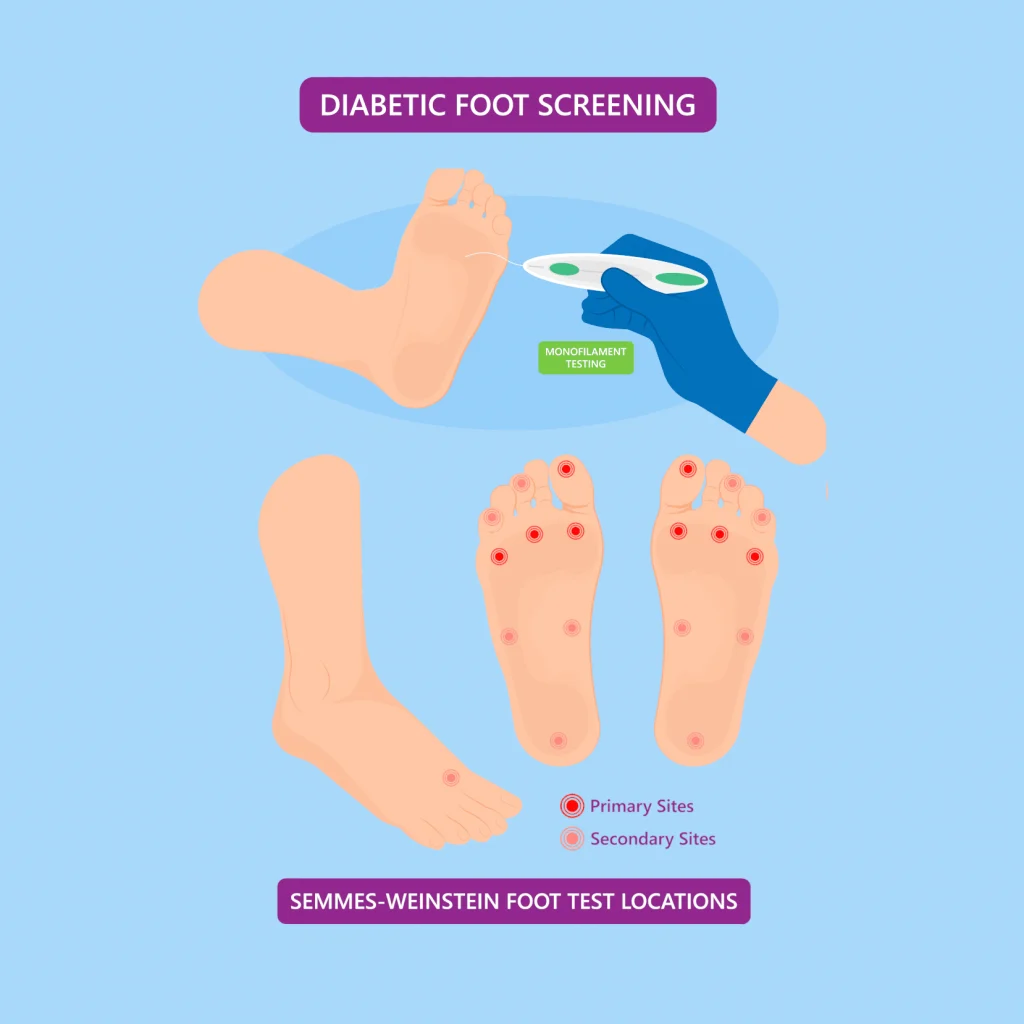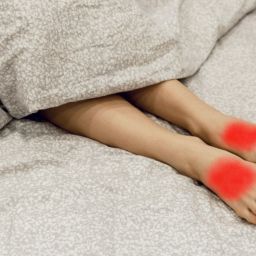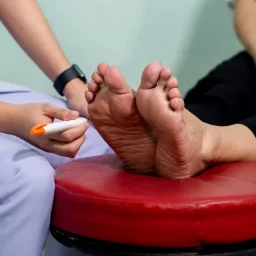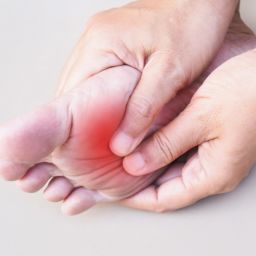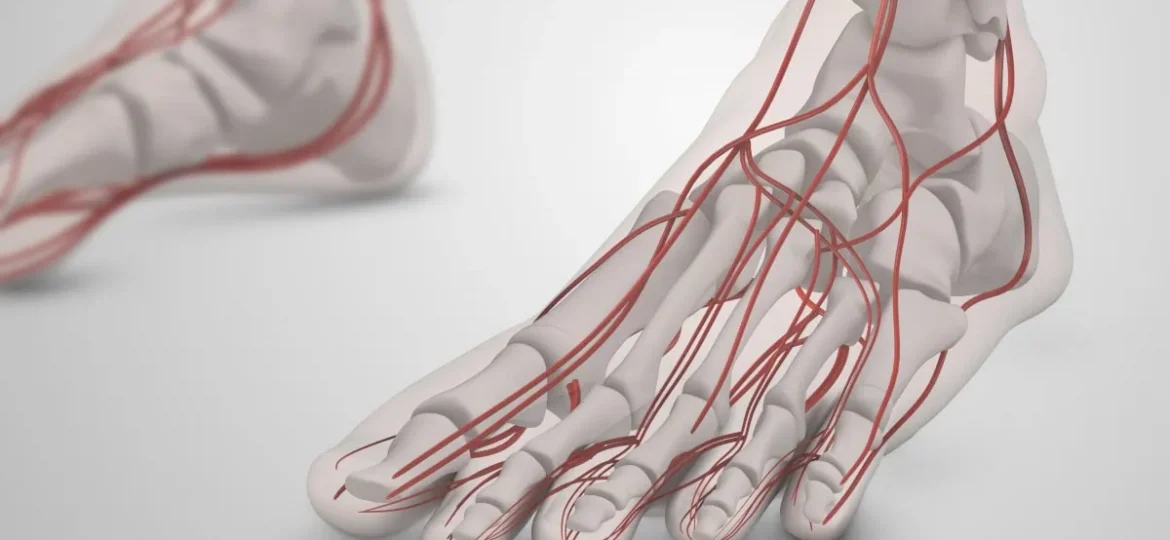
Podiatrists at Certified Foot and Ankle Specialists understand how challenging peripheral neuropathy can be for patients. Nerve pain in the feet affects millions of people, significantly impacting their quality of life and mobility. Finding effective neuropathy treatments for feet requires a comprehensive approach that addresses both symptoms and underlying causes.
Understanding Peripheral Neuropathy in Feet
Peripheral neuropathy occurs when the peripheral nerves that carry messages between your brain, spinal cord, and feet become damaged or diseased. This nerve damage can cause various symptoms, including burning pain, tingling, numbness, and muscle weakness in your feet.
The condition affects the sensory, motor, and autonomic nerves, leading to different types of symptoms. Sensory nerve damage causes numbness and pain, motor nerve damage results in muscle weakness, while autonomic nerve damage can affect blood flow and healing in your feet.
Common Causes of Foot Neuropathy
Understanding the root cause of your neuropathy is crucial for developing effective treatment strategies:
- Diabetic Neuropathy: The most common form, affecting up to 50% of people with diabetes. High blood sugar levels over time damage the peripheral nerves, particularly in the feet and hands.
- Vitamin Deficiencies: Particularly B vitamins, which are essential for nerve health. Deficiencies can develop due to poor diet, malabsorption, or certain medications.
- Autoimmune Conditions: Diseases like rheumatoid arthritis and lupus can cause inflammation that damages peripheral nerves.
- Toxic Exposure: Excessive alcohol consumption, chemotherapy drugs, and certain toxins can cause nerve damage over time.
- Infections: Viral or bacterial infections can sometimes trigger neuropathy as a secondary complication.
- Genetic Factors: Some inherited conditions affect nerve function and can lead to progressive neuropathy.
Recognizing Neuropathy Symptoms
Early recognition of neuropathy symptoms allows for prompt treatment and better outcomes. Common signs include:
- Burning or shooting nerve pain in your feet
- Tingling sensations that may worsen at night
- Numbness that typically starts in the toes and spreads upward
- Increased sensitivity to touch or temperature
- Muscle weakness affecting balance and coordination
- Loss of reflexes in the feet and ankles
- Difficulty sensing foot position, increasing fall risk
Symptoms often manifest gradually and may be mild at first. However, without proper treatment, neuropathy can progress and significantly impact your daily activities.
Comprehensive Neuropathy Treatments for Feet
Medical Management and Pain Control
Effective pain management is often the first priority in treating foot neuropathy. Several medication options can help treat pain and manage this condition:
- Prescription Medications: Tricyclic antidepressants such as amitriptyline have proven effective for nerve pain, even in patients without depression. These medications work by altering pain signals in the nervous system.
- Anticonvulsants: Medications like gabapentin and pregabalin are specifically approved for treating nerve pain and can provide significant relief for many patients.
- Topical Treatments: Prescription creams containing capsaicin or lidocaine can provide localized relief without systemic side effects.
- Nonsteroidal Anti-Inflammatory Drugs: While NSAIDs may provide some relief for chronic pain, they’re typically less effective for nerve pain compared to other medications.
Advanced Treatment Options – Diabetic Neuropathy for the Feet
When standard medications aren’t sufficient, several advanced therapies can provide additional relief:
- Nerve Blocks: Targeted injections can interrupt pain signals and provide temporary relief, particularly useful for severe, localized nerve pain.
- Spinal Cord Stimulation: For severe cases, implanted devices can deliver electrical impulses that modify pain signals before they reach the brain.
- Plasma Exchange: For autoimmune-related neuropathy, removing inflammatory substances from the blood can help reduce nerve inflammation.
- Immunosuppressive Therapy: Medications that modify immune system activity may be beneficial for certain types of neuropathy.
Physical Therapy and Rehabilitation
Physical therapy plays a crucial role in treatment for peripheral neuropathy by addressing muscle weakness, balance issues, and functional limitations:
- Strengthening Exercises: Targeted exercises help maintain muscle strength and prevent further weakness from developing.
- Balance Training: Specialized programs improve proprioception and reduce fall risk, which is particularly important when sensation is impaired.
- Gait Training: Learning proper walking techniques can help compensate for sensory deficits and reduce injury risk.
- Range of Motion Activities: Regular stretching and movement exercises prevent joint stiffness and maintain flexibility.
Managing Underlying Health Conditions
Successful neuropathy treatment often requires addressing the underlying cause:
- Blood Sugar Control: For diabetic neuropathy, maintaining stable blood sugar levels is essential to prevent further nerve damage and may even allow some recovery.
- Blood Pressure Management: Proper cardiovascular health supports nerve function and healing.
- Nutritional Support: Correcting vitamin deficiencies, particularly B vitamins, can significantly improve nerve function in some cases.
- Lifestyle Modifications: Reducing excessive alcohol consumption, maintaining a healthy weight, and following a balanced diet support overall nerve health.
Innovative Treatment Approaches
At Certified Foot and Ankle Specialists, we stay current with emerging therapies used when dealing with neuropathy treatments for feet:
- Regenerative Medicine: Stem cell therapy and platelet-rich plasma treatments show promise for promoting nerve healing and regeneration.
- Low-Level Laser Therapy: Some studies suggest that specific wavelengths of light may stimulate nerve healing and reduce inflammation.
- Electromagnetic Field Therapy: Certain electromagnetic frequencies may promote nerve regeneration and reduce pain in some patients.
- Nutritional Supplements: Alpha-lipoic acid, acetyl-L-carnitine, and other supplements may provide neuroprotective benefits.
Preventing Complications
Neuropathy can lead to serious complications if left untreated. Our comprehensive approach includes:
- Regular Foot Examinations: Routine checks help identify problems early, before they become serious complications.
- Proper Wound Care: Teaching patients how to care for minor injuries prevents them from becoming serious infections.
- Footwear Education: Proper shoe selection and custom orthotics can prevent pressure sores and injuries.
- Daily Foot Care: Establishing good hygiene and inspection routines helps maintain foot health long-term.
Managing Side Effects
Many neuropathy medications can cause side effects that need careful management:
- Drowsiness and Dizziness: Common with many nerve pain medications, requiring dosage adjustments and timing considerations.
- Weight Gain: Some medications may cause weight gain, which we address through dietary counseling and exercise recommendations.
- Cognitive Effects: Some patients experience mild cognitive changes that we monitor and adjust treatment accordingly.
- Drug Interactions: We carefully review all medications to prevent harmful interactions and optimize effectiveness.
When to Seek Specialized Care
Certain symptoms warrant immediate evaluation by a foot and ankle specialist:
- Sudden onset of severe nerve pain
- Open sores or wounds can develop on your feet.
- Redness, warmth, or drainage are signs of infection.
- Significant changes in sensation or motor function
- Falls or injuries related to balance problems
Long-Term Management Strategies for Neuropathy Treatments of the Foot
Successful neuropathy treatment requires ongoing commitment and regular monitoring:
- Regular Follow-Up: Scheduled appointments allow us to monitor progression and adjust treatments as needed.
- Medication Adjustments: Finding the right combination and dosage often requires time and patience.
- Lifestyle Counseling: Ongoing support helps patients maintain healthy habits that support nerve healing.
- Complication Prevention: Proactive care prevents serious complications that could lead to amputation or disability.
Hope for the Future
While neuropathy can be challenging to treat, new research continues to provide hope for better treatments. Clinical trials are investigating novel approaches, including gene therapy, nerve grafts, and advanced drug delivery systems.
At Certified Foot and Ankle Specialists, we’re committed to providing the most current and effective neuropathy treatments for feet. Our podiatric team of local foot doctors in the South East and South West of Florida, stays updated on the latest research and treatment options to offer our patients the best possible outcomes.
Comprehensive Care at Certified Foot and Ankle Specialists
Managing neuropathy effectively requires expertise, patience, and an individualized approach. Our board-certified podiatrists have extensive experience diagnosing and treating all forms of peripheral neuropathy affecting the feet.
We use advanced diagnostic techniques to identify the specific type and cause of your neuropathy, allowing us to develop targeted treatment plans. From conservative management to advanced therapies, we offer comprehensive care designed to reduce pain, improve function, and prevent complications.
Don’t let neuropathy control your life. Contact Certified Foot and Ankle Specialists today to schedule a consultation and learn about the most effective neuropathy treatments for feet available. Early intervention and proper treatment can significantly improve your quality of life and help you maintain the activities you enjoy.
Our compassionate team understands the challenges of living with chronic pain and is dedicated to helping you find relief through evidence-based treatments and personalized care. Together, we can develop a treatment plan that addresses your specific needs and helps you regain control over your foot health.
